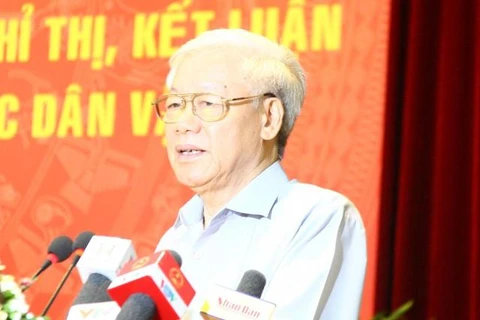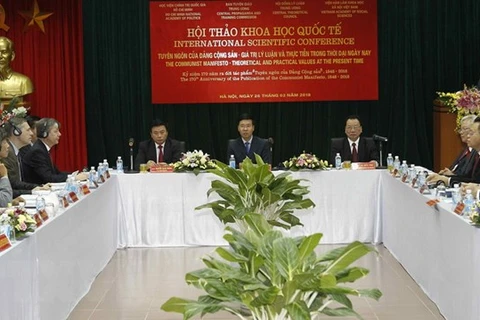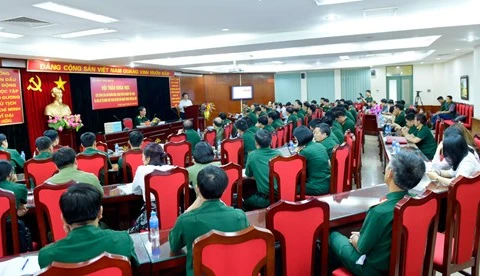 Nguyen Xuan Thang, Secretary of the Communist Party of Vietnam Central Committee, Chairman of the Central Theoretical Council and Director of the Ho Chi Minh National Political Academy, speaks at the workshop. (Source: VNA)
Nguyen Xuan Thang, Secretary of the Communist Party of Vietnam Central Committee, Chairman of the Central Theoretical Council and Director of the Ho Chi Minh National Political Academy, speaks at the workshop. (Source: VNA) Hanoi (VNA) – The scientific and revolutionary values of Karl Marx’s ideological heritage and the significance of Marxism to the world and Vietnam revolution were reiterated at an international scientific workshop held in Hanoi on May 4, on the occasion of Marx’s 200th birth anniversary (May 5).
Nguyen Xuan Thang, Secretary of the Communist Party of Vietnam Central Committee, Chairman of the Central Theoretical Council and Director of the Ho Chi Minh National Political Academy, stressed that the life and ideological heritage of Karl Marx have gone down in history, putting him among the greatest men of human kind.
According to Thang, among Marx’s huge theoretical heritage, the first to be mentioned is the dialectic materialism and historical materialism, which gave the progressive humankind, especially the working class, a great tool to gain awareness about and transform the world. This meant Marx had carried out a revolution in the entire perception of the world history, as for the first time in history, development rules of human society were discovered, integrated and presented in a systematic manner. Thanks to this, humankind for the first time had a fairly complete theory on development.
Thang said utilising dialectic materialism and historical materialism in researching the capitalist mode of production, Karl Marx outlined economic rules of the capitalist society and examined capitalism from its birth through its development to its annihilation. Another great discovery of Marx is the rule of surplus value, which is considered the “cornerstone “ of Marxism as a whole.
With those two great scientific discoveries, Marx laid a firm foundation for the realization of the ideology on scientific socialism – the theory on liberating the working class and humankind as a whole from all forms of slavery, oppression, exploitation and depravity.
Applying Marxism’s principles to the specific situation in Russia, V. I. Lenin further developed Marxism into Marxism-Leninism and brought about the success of the October Revolution in 1917.
In Vietnam, President Ho Chi Minh also employed and developed Marxism-Leninism in a creative manner to suit Vietnam’s situation. Marxism-Leninism and Ho Chi Minh Thought have become the ideological foundation of the Communist Party of Vietnam and served as the lodestar for Vietnam’s revolution.
The Communist Party of Vietnam (CPV) has led the Vietnamese people and nation in successfully conducting a revolution, persistently pursuing the goals of national independence and socialism. From an underdeveloped country, Vietnam has now entered a period of industrialization, modernization and international integration. The country’s position and role in the regional and global arena has been rising.
“The historic accomplishments of the more than 30 years of renewal again testify to the sustained vitality of Marxism-Leninism and Ho Chi Minh Thought, and the correctness of the CPV’s guideline on building socialism,” Thang said.
He affirmed that Marxism and Marxism-Leninism has and will be the torch for Vietnam revolution in the new era.
In his paper presented at the workshop, Professor-Doctor Bunthua Khuamisay from the Lao National Political and Administrative Academy said Marxism is the most complete and solid theory, which proves that the cause of humankind liberation is the cause of the working class, and the liberation of the working class is the core of humankind liberation.
He stressed that ever since its foundation, the Lao People’s Revolutionary Party has made Marxism-Leninism its ideological and theoretical foundation, and the lodestar for Laos’ Revolution. Therefore, the research of and application of Marxism-Leninism is of utmost importance to the country.
The workshop’s organising board received nearly 100 research papers, including 26 from international scholars. The papers affirmed the scientific and revolutionary values of Marxism, laying stress on the creative application and development of Marxism in current socialist countries. They said important achievements, both theoretical and practical, in socialist countries have proved the correctness and vitality of Marxism in the present era.-VNA
VNA
























